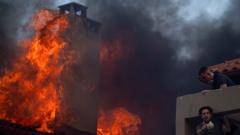As Syria embarks on a new political era with Ahmed al-Shara as president, he must navigate the complicated dynamics of international relations, military support discussions, and the intricate task of restoring his war-torn nation.**
Syria's New Leadership: Navigating the Complex Post-War Landscape**

Syria's New Leadership: Navigating the Complex Post-War Landscape**
Newly minted Syrian President Ahmed al-Shara faces monumental challenges in rebuilding his country post-civil war amid geopolitical tensions.**
In a significant turn of events reflecting the tumultuous political landscape of Syria, Ahmed al-Shara has emerged as the new president following the recent collapse of President Bashar al-Assad's regime. Once a leader of a rebel group aligned with Al Qaeda, al-Shara now governs a nation fragmented by years of civil war and sanctioned economic despair.
In an exclusive interview, al-Shara shared the monumental challenges that lie ahead for his administration, set against a backdrop of political instability and regional discord. His government is already deep in negotiations with both Russia and Turkey, key players that have exerted significant influence in the region, particularly as the conflict transitions into a new phase.
Al-Shara acknowledges the difficulties of convincing Western nations that despite his past affiliations, he can be a trustworthy leader of this war-torn country. His administration aims to lift the crippling sanctions that have exacerbated Syria’s economic struggles, allowing for the much-needed reconstruction of infrastructure devastated over a decade of conflict.
Highlighting his strategy to stabilize the nation, al-Shara suggested potential citizenship for foreign fighters who renounce their affiliations, opening a pathway for their integration into Syrian society. This approach aims to disarm lingering hostilities while simultaneously bolstering national unity in an era desperately in need of coherence.
As al-Shara takes on the presidency, he must deftly maneuver not only the internal challenges of rebuilding a nation but also the complex external relations between powerful nations that have involvement in Syria's future. His ability to do so will largely shape the trajectory of a country eager for peace, stability, and renewal.
In an exclusive interview, al-Shara shared the monumental challenges that lie ahead for his administration, set against a backdrop of political instability and regional discord. His government is already deep in negotiations with both Russia and Turkey, key players that have exerted significant influence in the region, particularly as the conflict transitions into a new phase.
Al-Shara acknowledges the difficulties of convincing Western nations that despite his past affiliations, he can be a trustworthy leader of this war-torn country. His administration aims to lift the crippling sanctions that have exacerbated Syria’s economic struggles, allowing for the much-needed reconstruction of infrastructure devastated over a decade of conflict.
Highlighting his strategy to stabilize the nation, al-Shara suggested potential citizenship for foreign fighters who renounce their affiliations, opening a pathway for their integration into Syrian society. This approach aims to disarm lingering hostilities while simultaneously bolstering national unity in an era desperately in need of coherence.
As al-Shara takes on the presidency, he must deftly maneuver not only the internal challenges of rebuilding a nation but also the complex external relations between powerful nations that have involvement in Syria's future. His ability to do so will largely shape the trajectory of a country eager for peace, stability, and renewal.



















